Sit Down With Dave Ritter
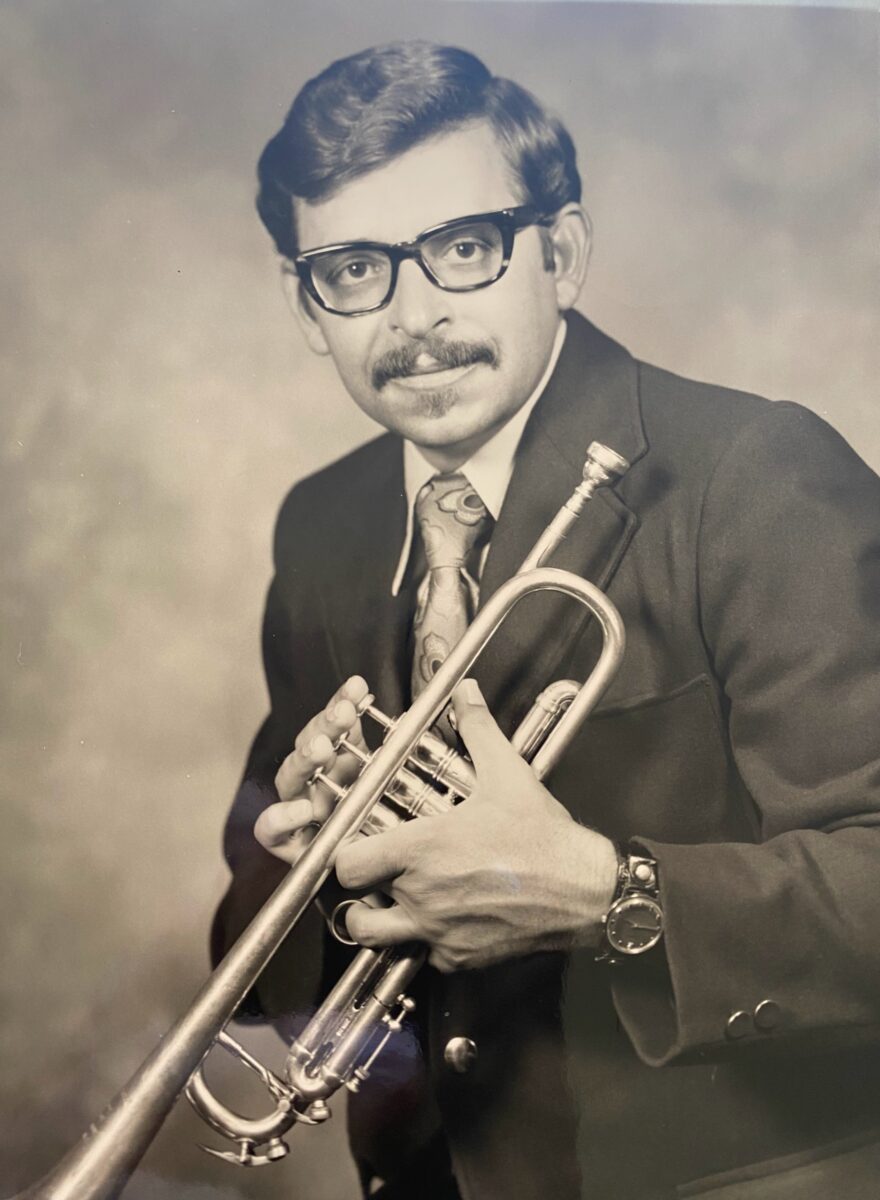
I recently had an opportunity to sit and visit with Dave Ritter, former trumpet professor at WTSU/WTAMU. Dave has played trumpet for 78 years! He taught many of us to play and teach. I first met Dave during the 1972 WT Band Camp. Dave did trumpet sectionals for the Honor Band every day. Wow. I learned so much! As a result of that experience I knew I had to attend WT as a music major.
Those four years of study at West Texas State University with Dave Ritter were enlightening. To say he is a master teacher is a severe understatement! The trumpet studio thrived for those years and many years thereafter.
What I didn’t realize was that he was teaching his students to teach band, in addition to mastering the trumpet. During my now 45 year career, I regularly find myself thinking about a teaching technique I have used and realize, “Dave Ritter taught me that”!
Many of Mr. Ritter’s trumpet students have gone on to achieve great things in the trumpet world. A good number have gone on to become band directors and administrators, numerous have become professional musicians, and yet others became trumpet professors themselves. During this interview Dave Ritter spoke often of his pride in the accomplishments of former students.
Dave’s devotion to his chosen career is notable. I have a respect for Mr. Ritter that has grown, and continues to grow, over the years. I consider him to be my mentor, teacher, colleague, and friend.
I hope you will enjoy hearing from Dave through this interview.
Cody Myers
- BME 1979
- ME 1987
Dave Ritter Interview
Monday, August 12, 2024
CM. Dave, tell me something about your early life.
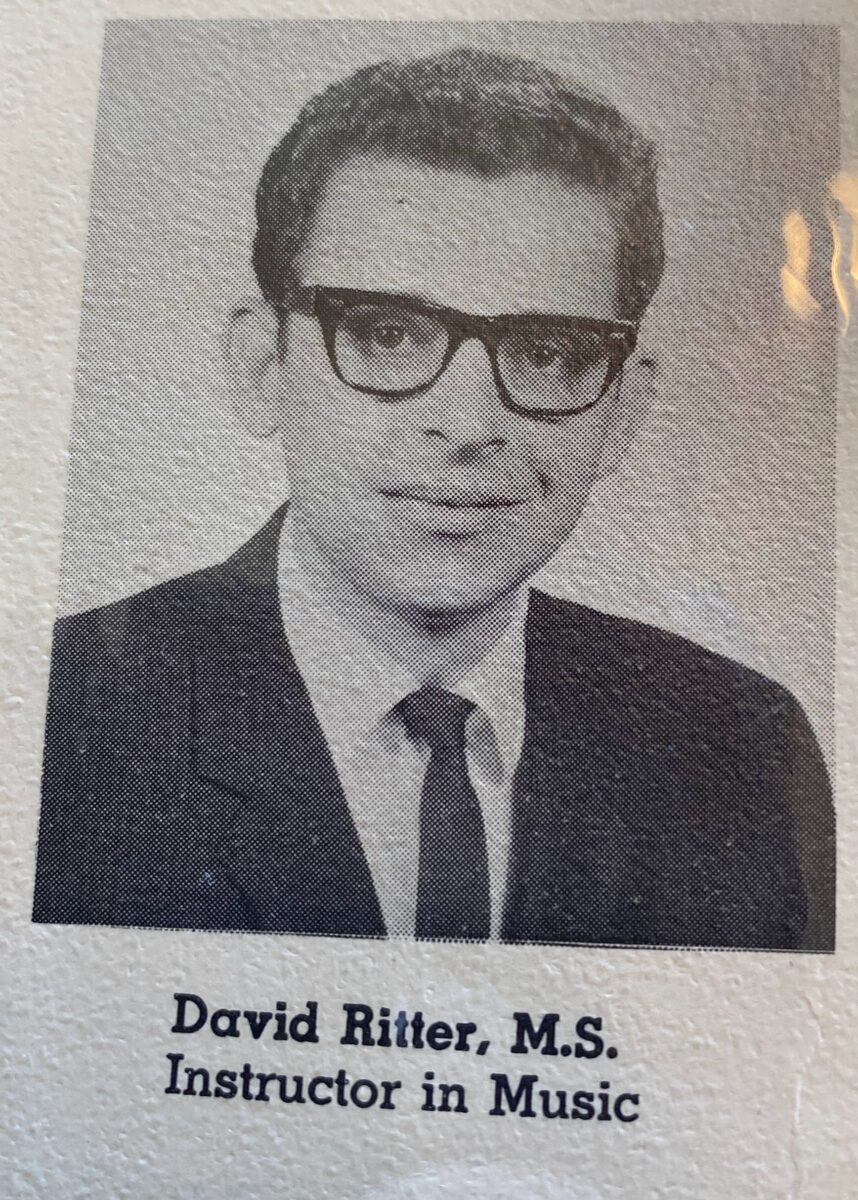
DR. My brother was in the air force and would come home on leave in his uniform, and that’s what I wanted to do.
At the age of 18, I found myself in downtown Chicago with my arm up saying, “Yes, I will join the air force.” I did my basic training at Sampson which is in Geneva, New York.
I took a battery of tests and qualified for two areas, special services (because of my participation in music) and jet mechanic. I’m not exactly sure where that came from. I could have easily wound up in Korea!
I tried out for the band and made it. They sent me, of all places, to Del Rio, Texas. There was an air base there. My concept of Texas, being from the mid-west, was cactus plants and desert. I was getting my orders and there were a couple of clerks sitting there. And I said, “Where the hell is Del Rio, Texas?” One said, “It’s way out in the middle of nowhere!” I was there about 5 weeks and had a whole lot of fun!! Then I got reassigned to Sherman(Texas).
Then in the spring of ’58, I was discharged. I’m so glad I went to the service. I wasn’t ready for college.
I was the Indiana (solo trumpet) state champ. In the state of Indiana in those days, they had a city contest, in which I always made first. And then they had region contests and if you made first, they would send you to state at Butler University in Indianapolis. There they named the top 3 soloists. One first. One second. One third. If you didn’t make one of those 3, you got nothin’! I was first my Junior and Senior year. I was the state champ.
In later years, what really blew me away, is that nobody tried to recruit me! NO college came after me! Then I got to thinking, maybe they saw my transcript!!
If it hadn’t been for John Haynie, I probably would have stayed in the air force.
CM. What influenced you to play trumpet?
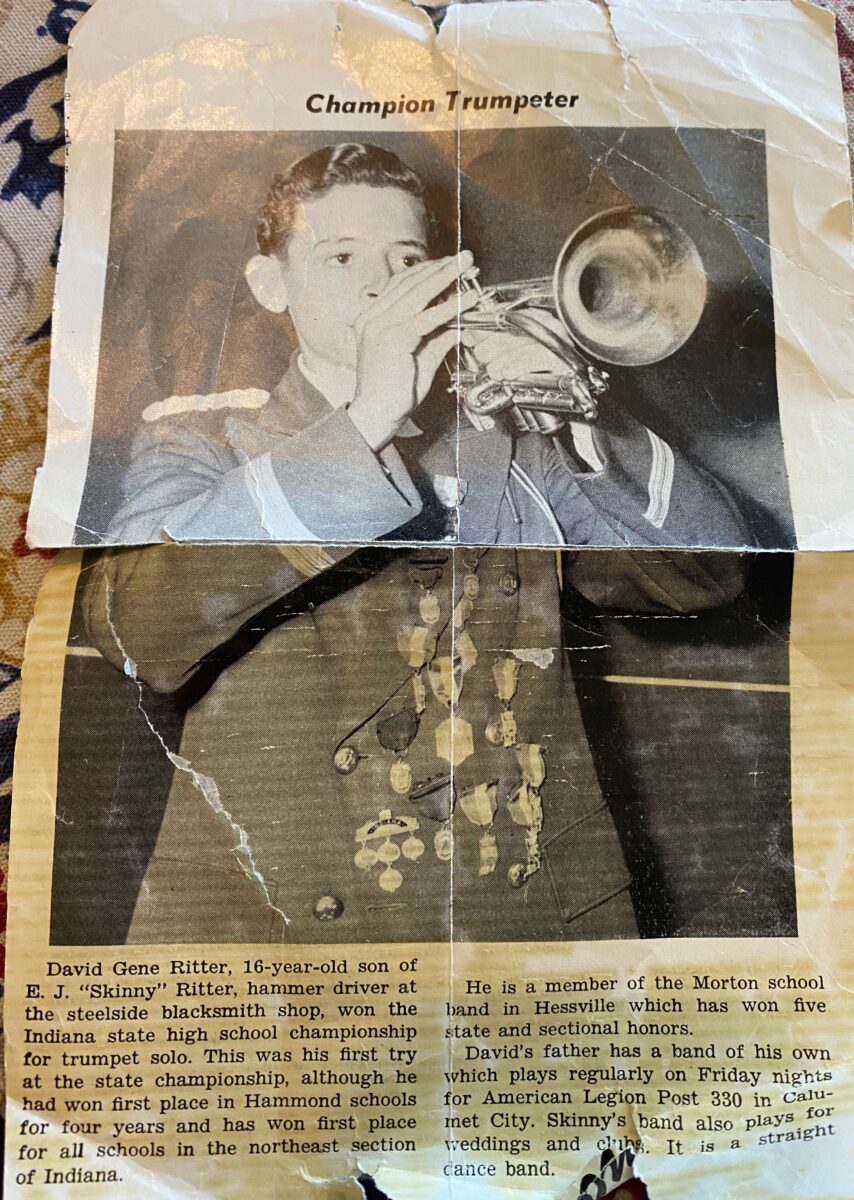
DR. My older brother played tuba in the band. He started on cornet and then switched to tuba. So, he had a cornet laying around the house and taught me how to play the B flat concert scale when I was 10. I guess it came pretty easy to me. I got in band in the 5th grade. It was the one thing that I could do in school. Anyway, that started it.
I had an excellent band director; his name was John Melton. He was a trumpet player and switched to flute and became a very fine flute player. He started me as a beginner and I remember we played, “Easy Steps to Band”.
What’s really interesting about John Melton was that he taught there for 40 years and always had good bands. I never really took a private lesson. When I had time during the school day, I would go down to the band room instead of sitting in the library looking for National Geographics. He would hear me practicing and make some suggestions. The first big contest I went to, he had me do “Stars in the Velvety Sky”.
Back in those days, you didn’t go to contest unless you played a solo with triple tonguing in it. This was my first big contest to go to. I think I was a freshman. As I practiced, he came in…there was a little triple tonguing thing … I was going TTT TTT TTT. He said, “You have to triple tongue that”. I said, “What’s that?” He demonstrated it and I said, “What are you doing?” He said, “I’m going TTK.” For some reason, I was able to do it right off the bat. The only problem with it is I could only go one speed! Which was no problem if the piano player just followed me!
I went back and visited him (John Melton) after he retired. We had an interesting talk. He knew Revelli. He heard Revelli’s first band. Hobart, Indiana was just down the street from where I grew up. They were our big rivals.
CM. Discuss the path that eventually led to WT.
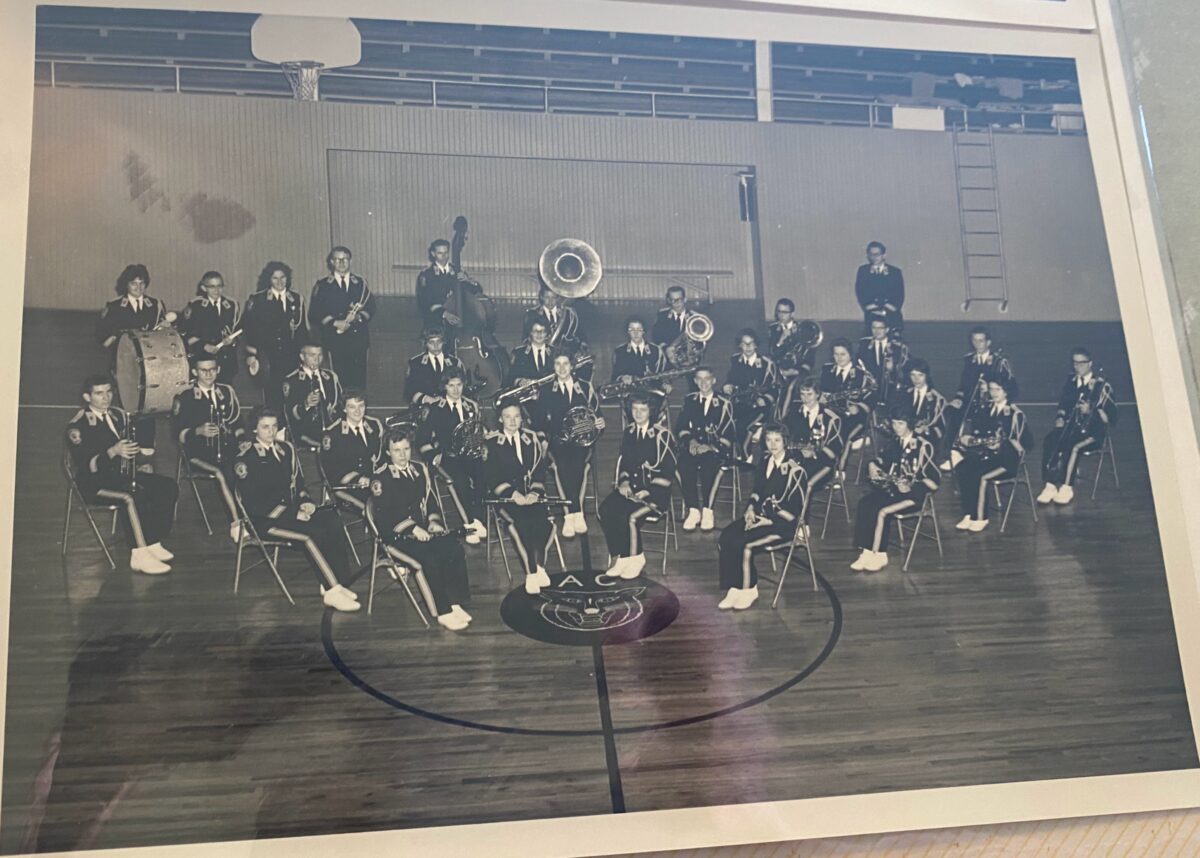
DR. (Beginning the spring of 1958) I taught lessons (as a teaching assistant) at North Texas.
I was first chair in the band the whole time I was there. Maurice McAdoo was the director at the time.
I always had about 15 students, I was playing in the band, the orchestra, the brass choir. I was playing in all these ensembles and taking a full load. I would get to school about 7:00 in the morning and come staggering in about 6:30pm. My studio was right next to John Haynie’s studio. So that was really my first job. And then I went to Archer City(as band director).
I was there just one year. And it was a tough job. A friend told me, “Whatever you do, don’t let ‘em know you’re a Yankee!” I hadn’t been in town five minutes, and I think the whole town knew there was this new Yankee band director. So, I had some strikes against me to start with.
We(the band) had the concession stand at the basketball games. And so, I thought, “Hey, this is cool!” I was up there every day and night. We sold popcorn, pop, and candy, and parents made sandwiches, and we sold those. We made enough money, I bought a brand new bassoon. A kid picked it up and learned to play. So, we had a little band with a bassoon in it. He was a good player.
I had Larry McMurtry’s(novelist) younger sister and brother in my band.
I was really frustrated there. During a lesson, John Haynie gave me a piece of advice:“Whatever job you take, treat it like you’re gonna be there the rest of your life.” That helped.
By the end of the year, I really had the band going. I’m so glad that I had that high school job. I was “Mr. Music” in Archer City. It helped me, I think a lot, in teaching you guys (college trumpet students). Because I had an idea of what you guys were going to face when you left WT. I was smart enough to realize that I was teaching mostly future band directors. I always felt like to be a good band director, you had to have 3 things going for you:
- You had to be organized.
- You had to have the ability to relate to people.
- If you were going to teach music, you had to be a musician.
The only way you’re gonna learn to be a musician is on one instrument. Phrasing, intonation, musically sensitive. So that is how I approached my teaching with my students. That’s the way John Haynie taught me, and I passed it on to you.
CM. Ritter then went to Arkansas State Teachers College, now University of Central Arkansas.
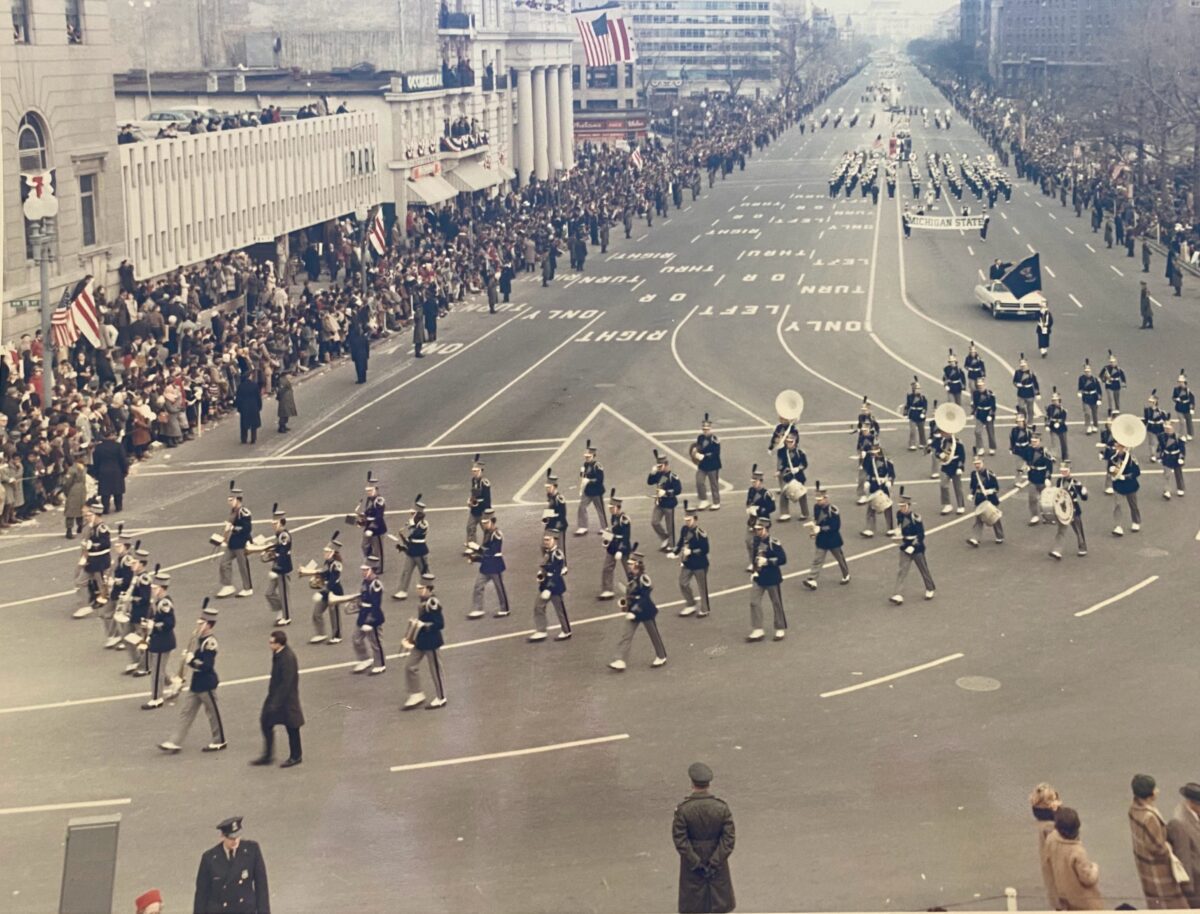
DR. It was very small, and I was there three years. But still, I wanted better things.
John Haynie called me, and he said, “Hey, there’s a job opening up at West Texas that I think would be perfect for you.”
CM. So Dave moved on to West Texas State University.
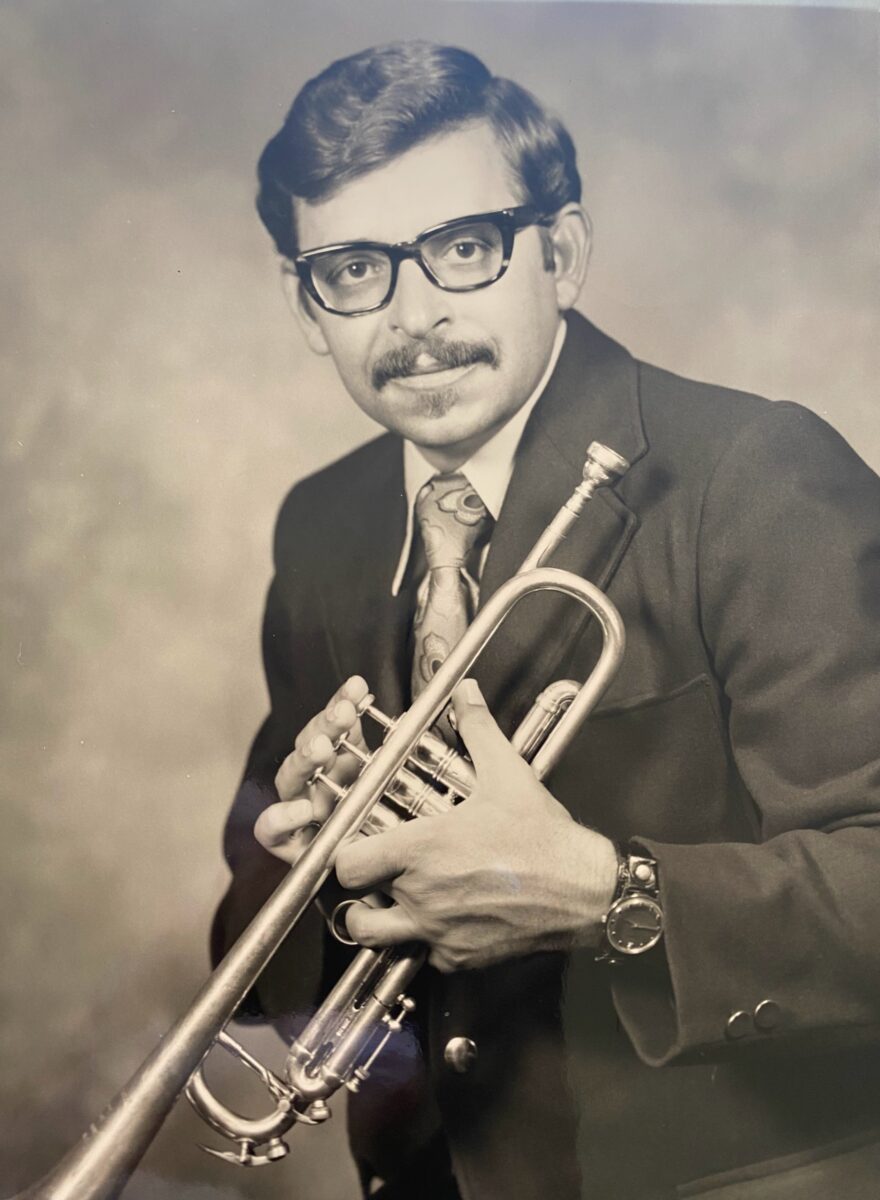
DR. I taught there 36 years.
At that time, there was just one brass teacher here, Gerald Hemphill. Don Baird and I came here at the same time. So, we had a high brass teacher and a low brass teacher at the same time. I think Garner had been here a couple of years, at least. John Green (dept head) was an organizer and a multitasker. He told me his plans of where WT was going and what he wanted to accomplish. I was very impressed and that’s kinda what I wanted. I was enthusiastic. So that’s what attracted me to WT.
CM. How did you develop the WT Jazz Band?
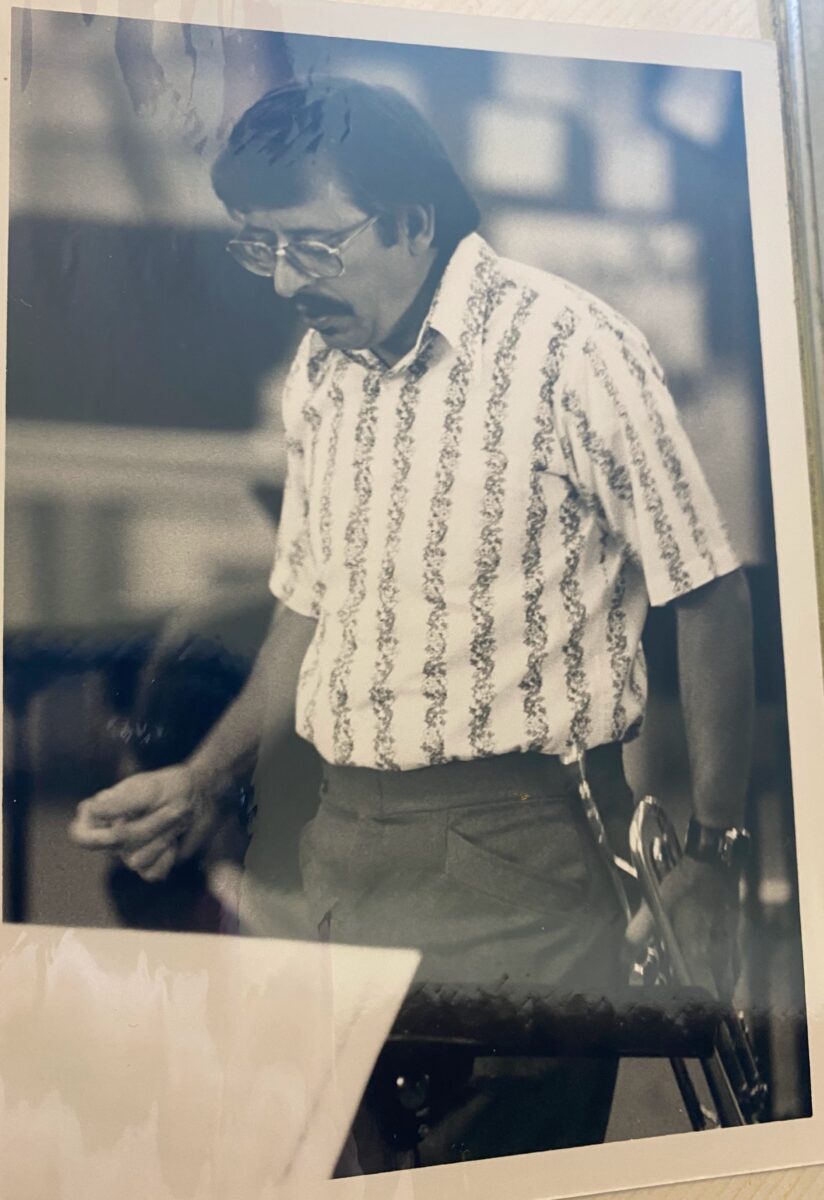
DR. When I came here we really didn’t have a jazz band. They would have a jazz festival here. This was in those early days, about 1965. Every (area) school had a jazz band. Tulia had a jazz band. Perryton had a jazz band. It was a big festival. Garner would put a group together and they’d learn about 4 tunes and play. That was the jazz program at WT. So I went to John Green and told him, (“We need a jazz program here at WT”). He said,” Okay”. So anyway, I did the jazz band, no credit, no budget. The way we operated was I put a dance book together for big band. I booked the band and we played(gig’s) around the panhandle. And I’d book it for around 200 bucks or something and I’d give each of the kids in the band 20 bucks. I used the rest to buy charts. We did that for a long time up until Umberson became department head. Same thing with the brass choir.
There was a weekend group that I played with. We formed it the in ‘70’s. Bart Edwards, Nick Nixon, and I played a lot of gigs. At intermission one night, I said, “Why don’t we form our own group? I even have an idea about the instrumentation. I liked the sound of the Nashville Brass. Two trumpets and two trombones. So, we formed Tiffany Brass. I wrote a few charts and Bart wrote a couple.” My job was to keep brass (players). And I was using students. We even made a recording. It was a good band.
CM. I know you were involved with additional duties. Tell me about that.
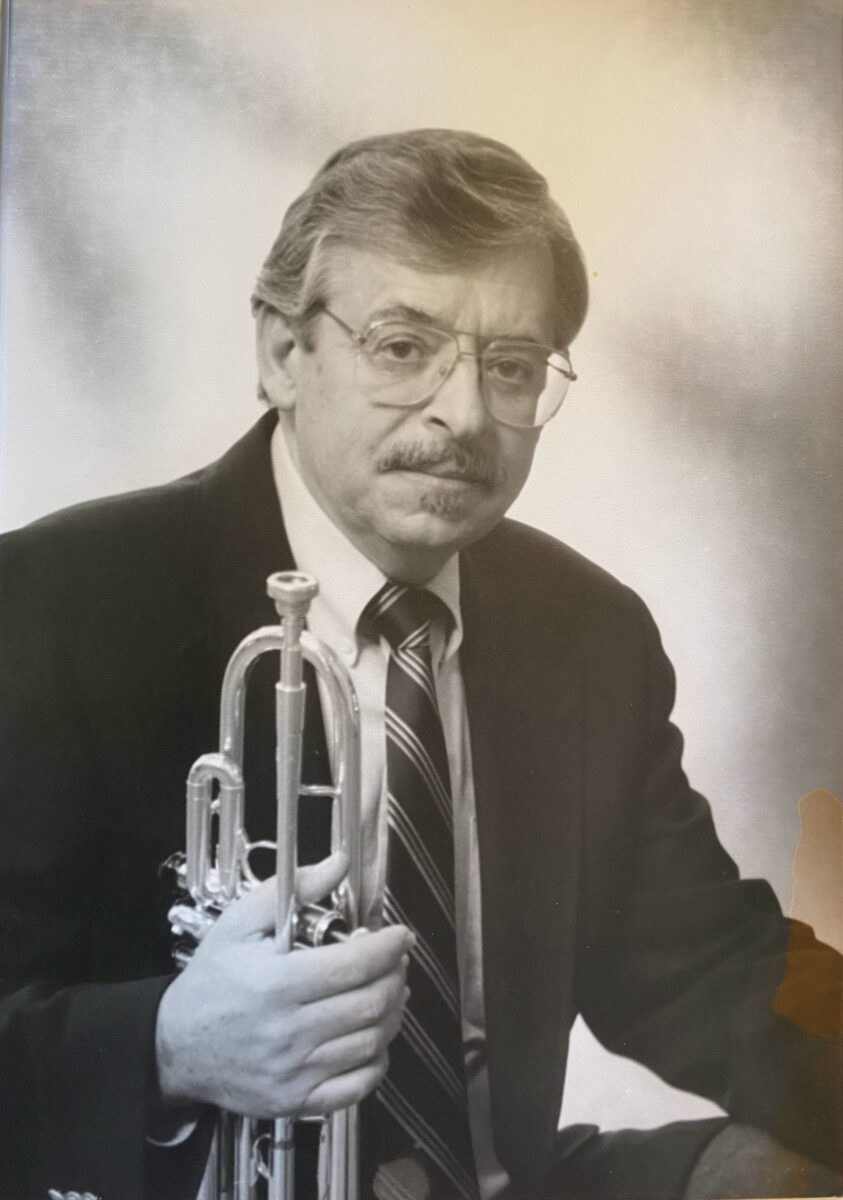
DR. I really enjoyed running the WT Band Camp. There was so much I liked about it. Camaraderie was one of them. Just interacting with everybody.
My job was to, first of all, put this(the camp) together. And I learned a lot from Harry(Haines) about that. Secondly, my job was to make sure the people that were teaching at the camp could do that. Whatever I had to do to make their job easier, that was my job. It was just fun - the golf tournaments, the fajita parties.
You know we had the faculty lounge and Mike Watts was in charge of it. I’m really glad I had him to do that. He had all the little golf tournaments. There was always something going on in the lounge. That was probably one of my best experiences.
I was the assistant camp director for 5 years before becoming director of the camp. We began trying to increase band camp numbers which had recently declined. I made up a slide show and I just traveled all over the state recruiting for band camp. It is of interest that at one time about half of the band camp students were coming from the Permian Basin. Then came the oil bust. Suddenly we were getting about 95 students from there rather than 500! We eventually built it back up with the help of the band directors.
Another thing that I don’t think many people realize that I’m very proud of about what I did (at WT) was Showcase. I’m the one that conceived how we were going to do that. I used to run that. Joe Nelson helped me a lot, but I’m the guy that figured out how to do all that. It was fun. It was such a great experience. The kids really liked it. Everybody was involved, the whole music department.
CM. I studied with you beginning in 1975. We were referred to as the “Trumpet Dynasty”. Detail the steps that created such a prolific trumpet studio.
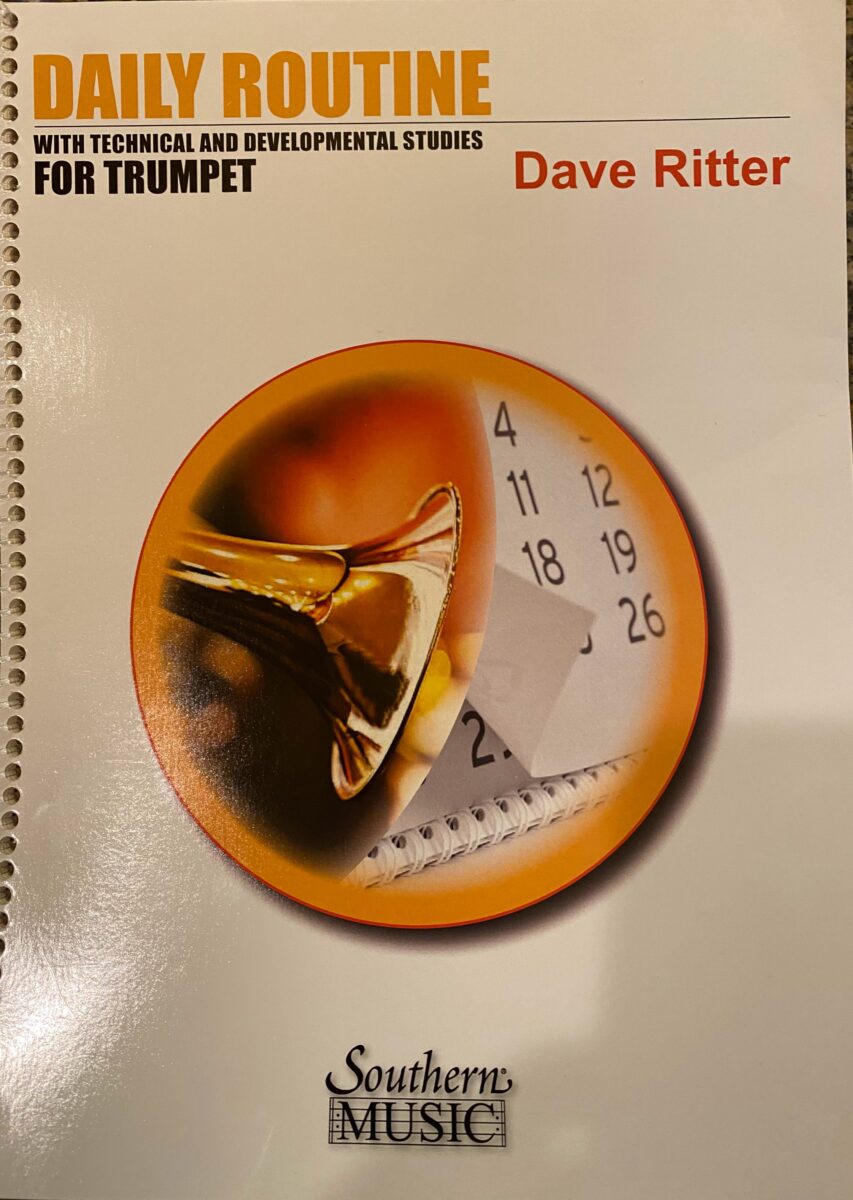
DR. Well, I always did what John Haynie did. I always played with the band when they went on tour. The thing I got out of it was that I could see if what I was doing in my studio was carrying over to what you guys were doing. I went with the band to that first TMEA performance and it was good. Four years later, when the WT band went(to TMEA), it was spectacular!! That was the year they did “Propagula” and “Rocky Point Holiday”. The trumpet section was dynamite. I still remember the warmup. The electricity in that room was just unreal! You could feel it. And Gary(Garner) did what he always does, he took “Rocky Point” a little faster than he ever had. I’ve heard that recording and it’s unbelievable. That concert was the talk of TMEA. That was when WT really started to grow. And we gradually started adding faculty members.
I have no regrets. I really enjoyed my time at WT.
When you get to be my age, I’ll be 88 in just a few days, you start reflecting a little bit on your life. I think back about all you people… you and Ken Van Winkle, all these trumpet students and how great it was. (Dave named MANY students and his pride in their achievements). And how great you guys were. (I was)so blessed to teach all of you. And I learned a lot from you guys over the years.
CM. Who influenced your trumpet teaching?
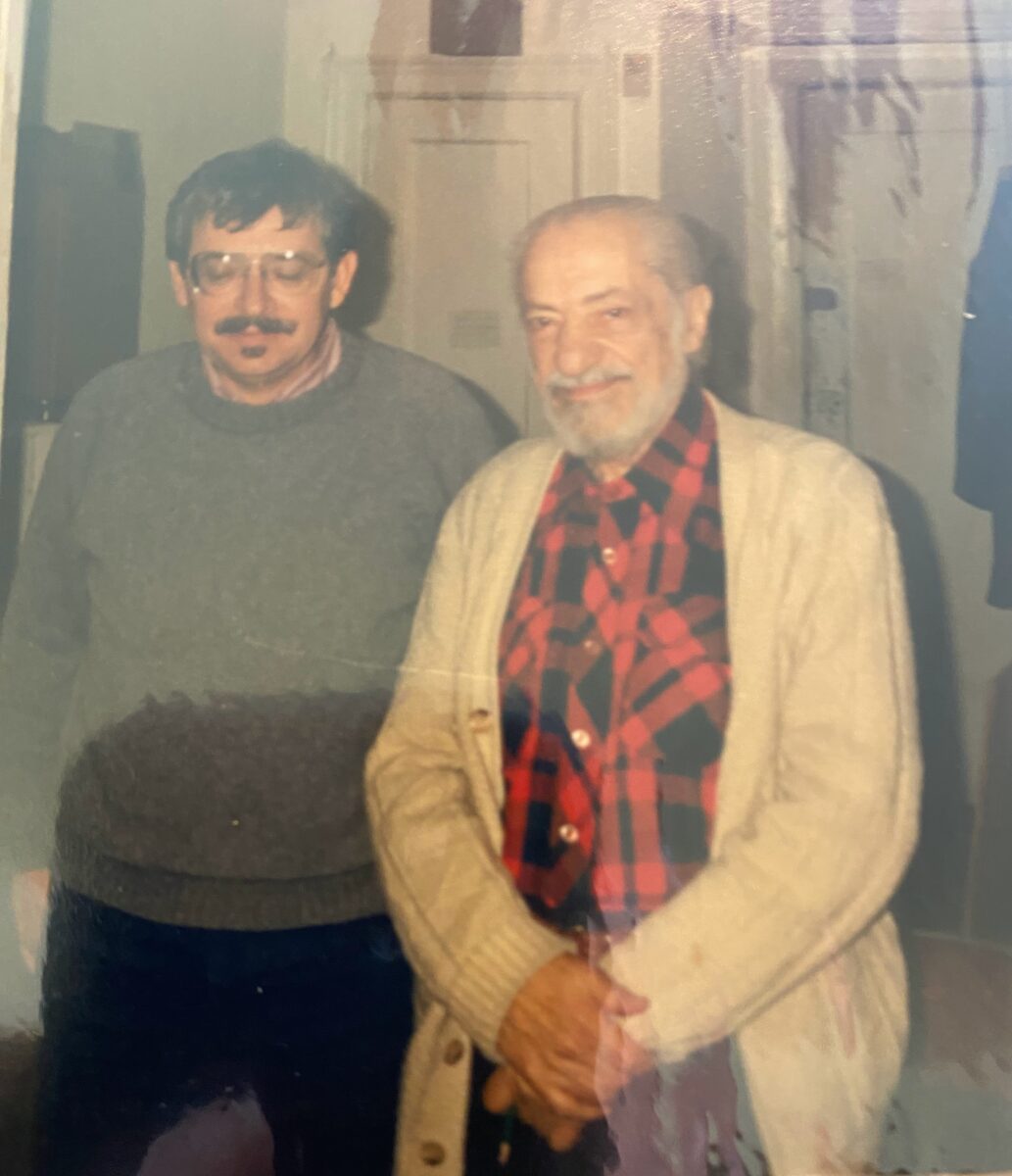
DR. There were probably two main influences on me (regarding my teaching).
John Haynie would be a big one. The other was Carmine Carusso. Carmine Carusso, you were there when I first started messing with that, weren’t you?
CM. Yessir.
DR. Both times the band went to Carnegie Hall, I went with them and played in the band. I took all the trumpet students to Carmine’s studio. He talked to us about an hour and a half about his method and so forth. I stayed and talked to him for a while after that.
A trumpet friend from graduate school, Pete Chercheck, had a teaching approach he learned from Carusso and was having a lot of luck with it. Marvin Stamm studied with Carusso and arranged for him to be a guest clinician for the Denver Trumpet Symposium (That’s where Chercheck was exposed to the Carusso method).
I called Pete and we discussed Carusso. He sent me “the six notes” and some intervals with some instructions. That’s how I got started(with the Carusso method). When I had questions, I would call Carmine on the phone. For quite a few years, I would call Carmine about once a month and just talk to him. He had a lot of influence on my general approach to teaching. He never said to a student, “That’s wrong.” If the student was doing something incorrectly, I would show him something that was correct. Carmine also said, “I never judged students. I always felt like I was there to help them.” That was a big influence on my teaching.
I always felt like when somebody (came) through my studio door, they were there to learn to play the trumpet. And it was my job to do everything I could to help them do that. I feel that I became a pretty good teacher in that I could recognize stuff (diagnose issues) in players and how to go about correcting them.
CM. Discuss the chemistry between you and the rest of the department?
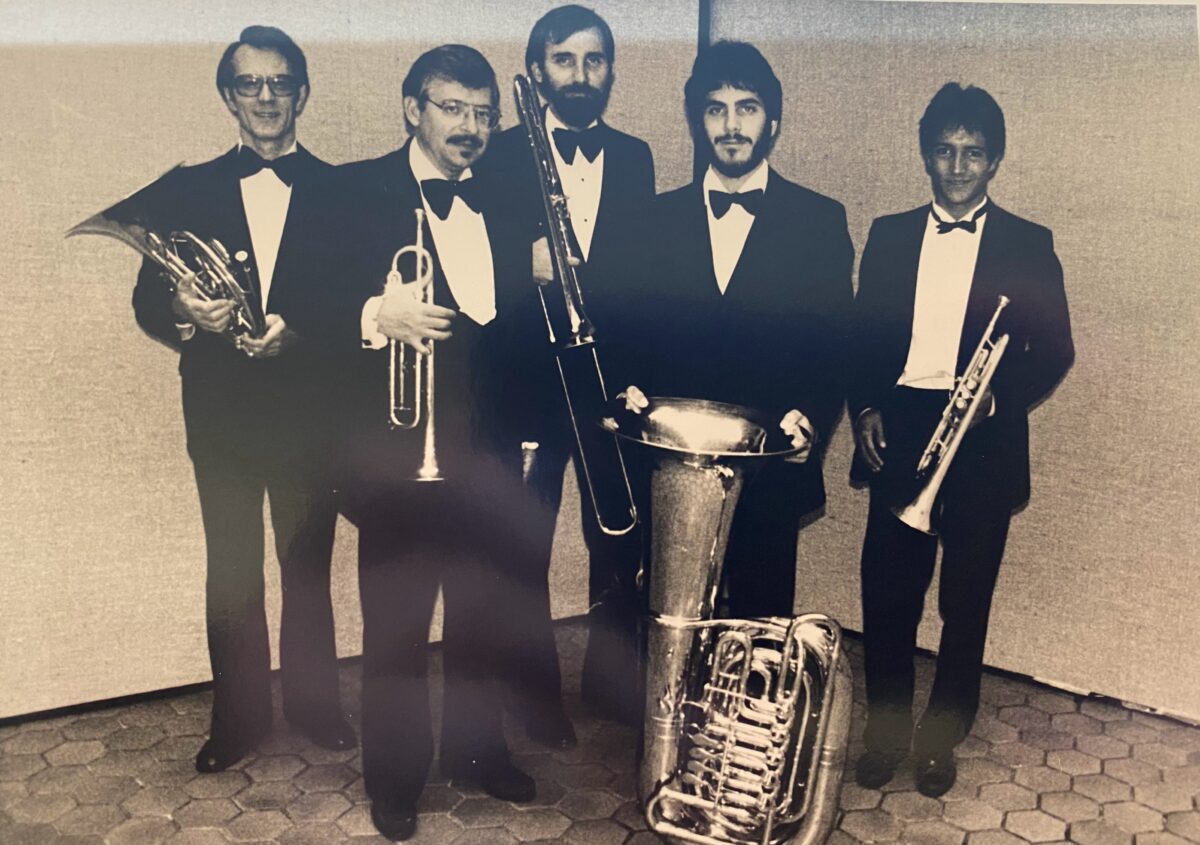
DR. We had a lot of fun. That was part of the whole scene. Gary (Garner) Don Baird. and there were a lot of other people involved. Friendships and so forth that were so great. We played a lot of golf and spent a lot of time doing stuff together. A lot of joking around. There was a lot of camaraderie.
CM. I recall you performing solos with the WT Band on occasion. Do any of those performances stand out?
DR. There were two of them I really enjoyed. Actually, I transcribed 3 solos from piano scores for band and trumpet and played them with the band. One of them was “Fantasy in E flat” by Barat, and the other one was “Boutade”, by Gabaye and the last one I did was the Brandt “Concerto for Trumpet”. Another one was “Capriccio” by Bozza.
CM. Is there a performance venue which is special to you?
DR. Carnegia Hall was interesting, yeah. When we got to the hall, and started rehearsing, I thought, “WOW! I’m hearing stuff that I didn’t hear before.” The acoustics in that place were crazy. That venue was really great.
The concerts that I played with the band at TMEA were always great and fun to do. A lot of the concerts I played on tour with the North Texas Band… I can remember them quite well.
I played for a summer with the American Wind Symphony in Pittsburg. There was a guy named Robert Austin Boudreaux who happened to be a trumpet player. He was the conductor. There’s a park down there where 2 rivers join to create the Ohio River. We played off a barge (next to the park). We played one or two concerts a week. Sometimes we would go on tour. A tugboat would push the barge along the Ohio River. You double the sections of an orchestra. That was the American Wind Symphony. They played almost all commissioned works. We played at least two pieces by Robert Russell Bennett. “The Ohio River Suite”, and “The History of the Winds”. That was a great experience!
I played with the Little Rock Symphony for a while. You know, Francis McBeth used to conduct that orchestra. I knew Francis quite well. You know, he was a trumpet player. We played some gigs together in Arkansas.
CM. I’ve heard you discuss John Haynie’s influence on you and your career. Review that for me.

DR. I got a lot of good advice, from John Haynie. I started studying with John when I was still in the Air Force. He would come up to Sherman(where I was stationed at Perrin Field) to teach on Saturdays at Olen Atherton’s Music Co. One of the guys in the band said, “Hey, you need to take a lesson from this guy.” So that started it. I studied with John Haynie probably longer than anybody - about 8 years. The last 3 of those 8 years were in summers as I worked on my masters(at North Texas).
John Haynie said, “Dave, I know your enlistment’s coming up. What are you gonna do?”
And I said, “Well, I guess I’ll just reenlist in the Air Force.” And he said, “Well, have you ever thought about going to college?” I looked at him and said, “Mr. Haynie, I’m too dumb to go to college! I barely got out of high school!” He said, “No, I think you’d do really well. Matter of fact, if you’ll come to North Texas as a freshman, I’ll make you one of my graduate assistants. I’ll tell you what…. why don’t you come on over and just spend a day at North Texas and look us over?” So, I went. I met all the trumpet students and heard the great performing groups. I was just enthralled! If it hadn’t been for him, who knows what would have (happened)? I had even thought about moving back to Hammond, IN where I grew up and working in a steel mill or something.
CM. Tell me about your family and future plans.
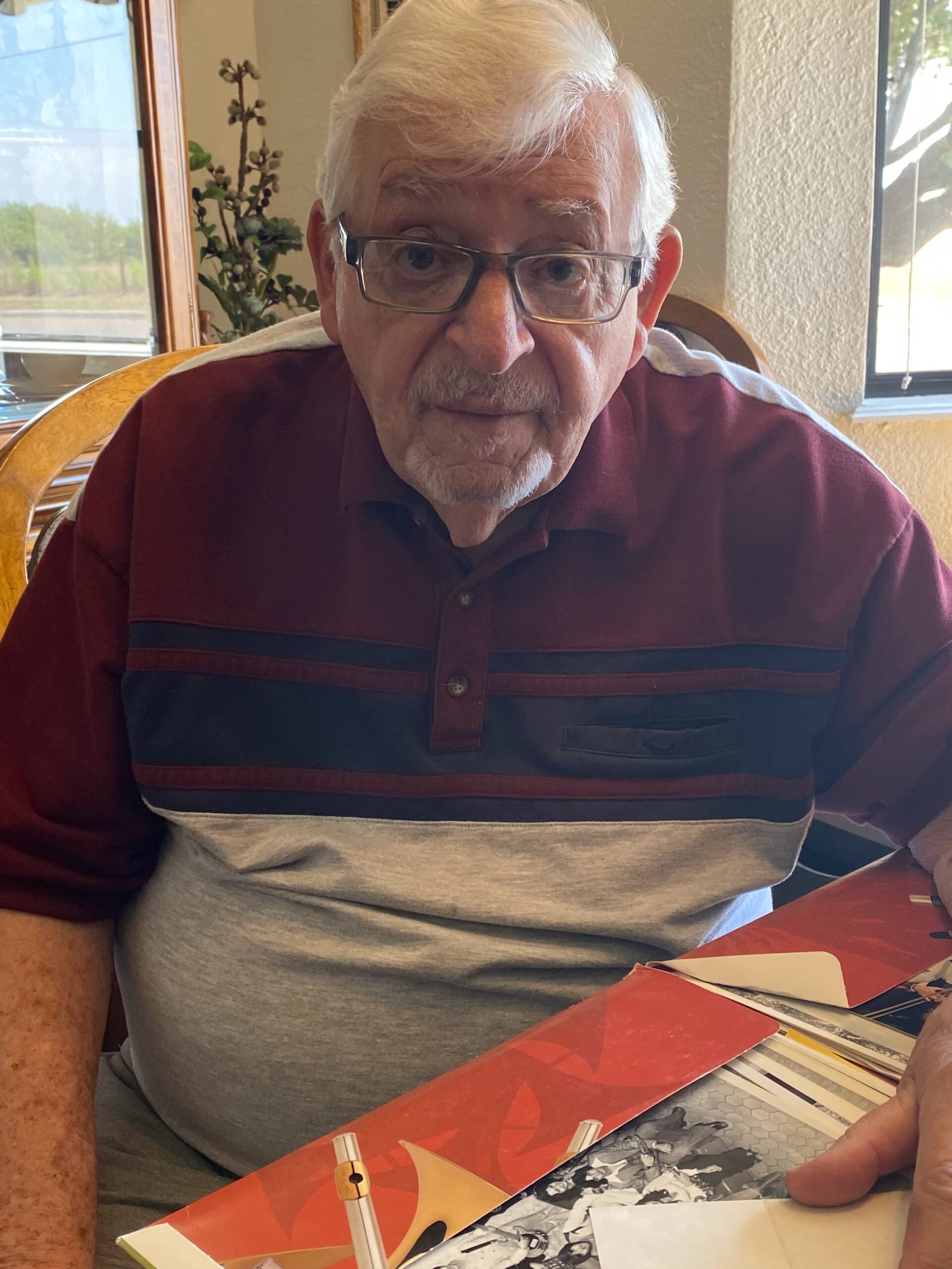
DR. My wife (Linda) and I have been married 12 years. I have 2 daughters and 6 grandchildren, three grown. I have 3 great grandchildren.
I’ve been thinking about doing(recording) another CD. I’d like to have a bass, piano, and myself.
CM. I remember you challenging the Symphonic Band trumpets to memorize “The Carnival of Venice”. We played it in unison with the band on a spring concert. That was one of my many lasting memories in the WT Band. I appreciate you helping us develop the tools to perform at that level. Thank you so much for all your influence.
DR: I thank you guys for (enabling me) to have that whole teaching experience. It was great. I have no regrets whatsoever, and a LOT of fond memories. I got to watch a lot of my former students go on and be successful and know that I had a little bit to do with it. Maybe, in some cases, a lot!
CM. Are there additional thoughts you would like to share?
DR. I’m one of those extremely fortunate people that got to do exactly what I wanted to do. I wanted to play and teach the trumpet. And that’s exactly what I got to do.

Cody and Dave Ritter after the interview
4 Comments
Leave a Comment
You must be logged in to post a comment.

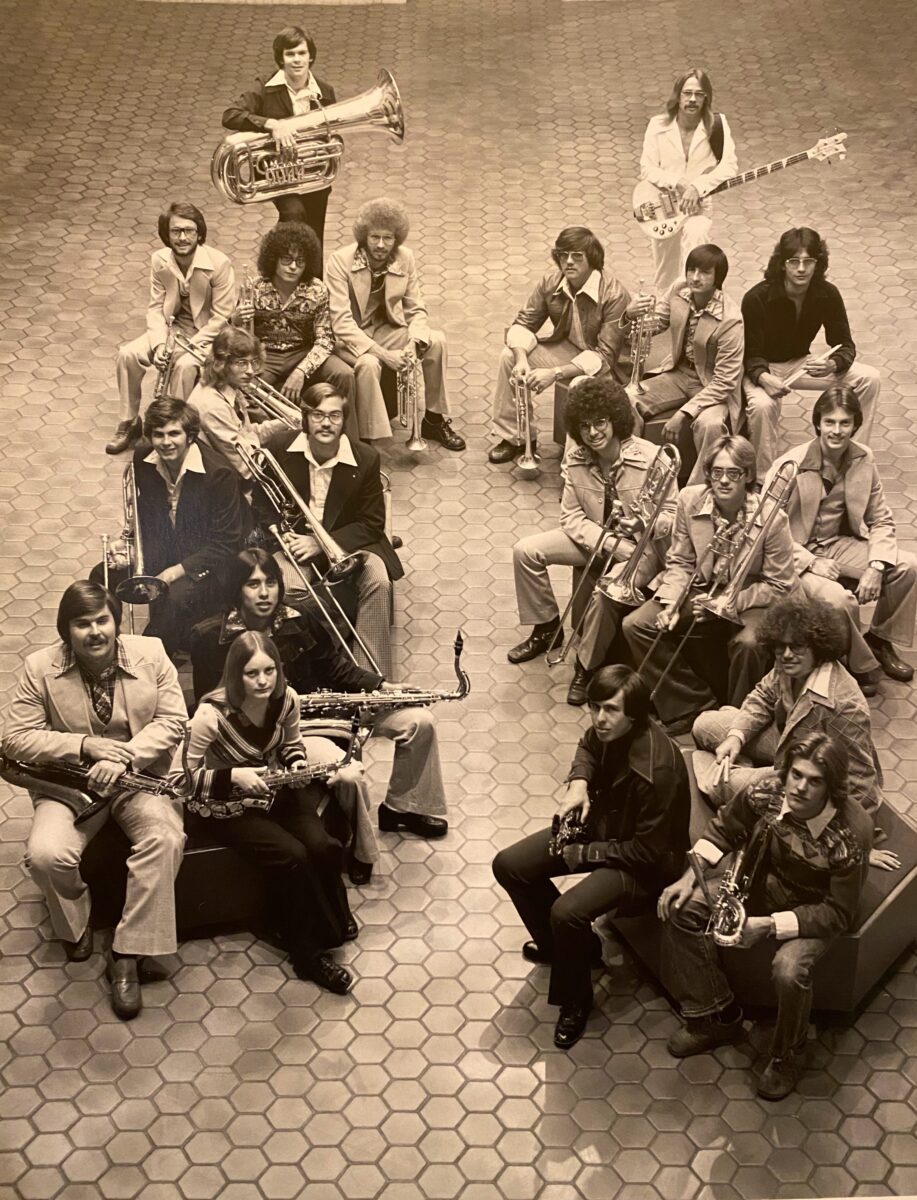
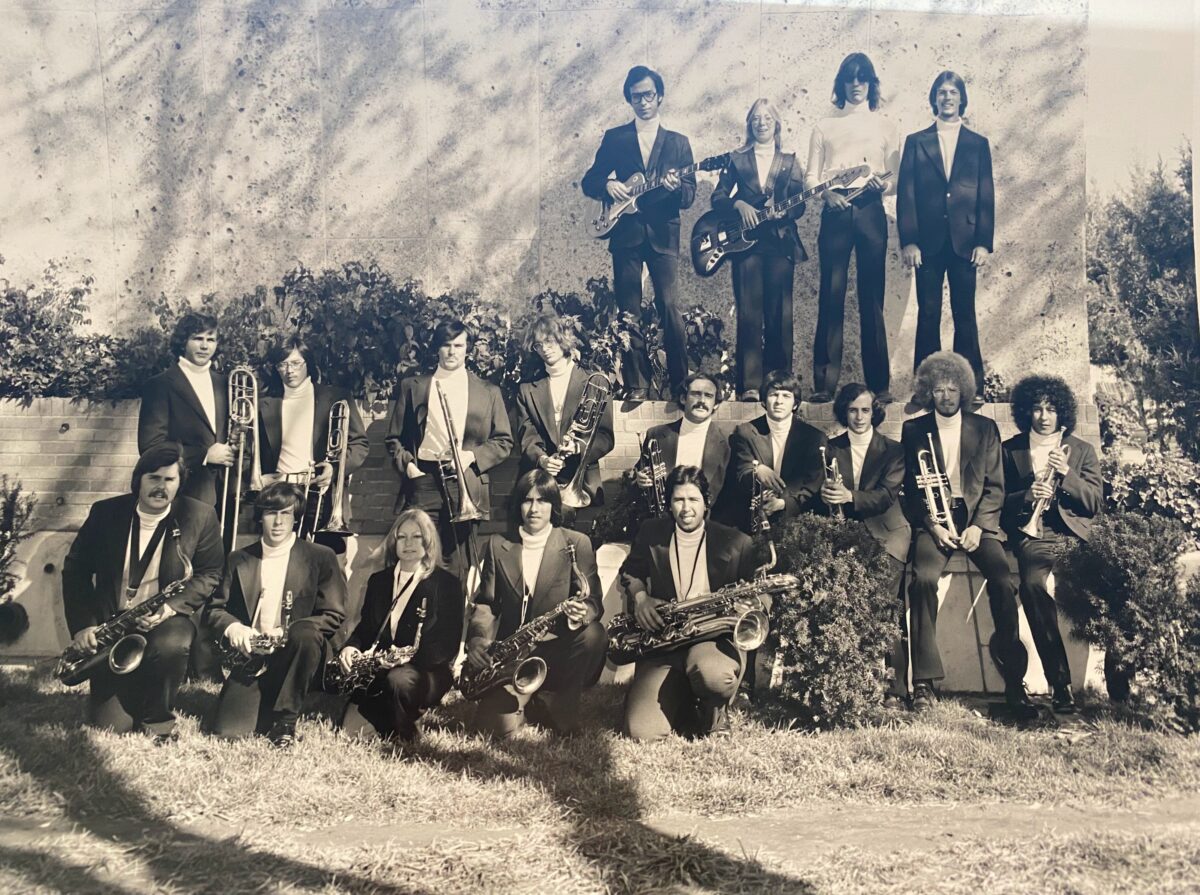
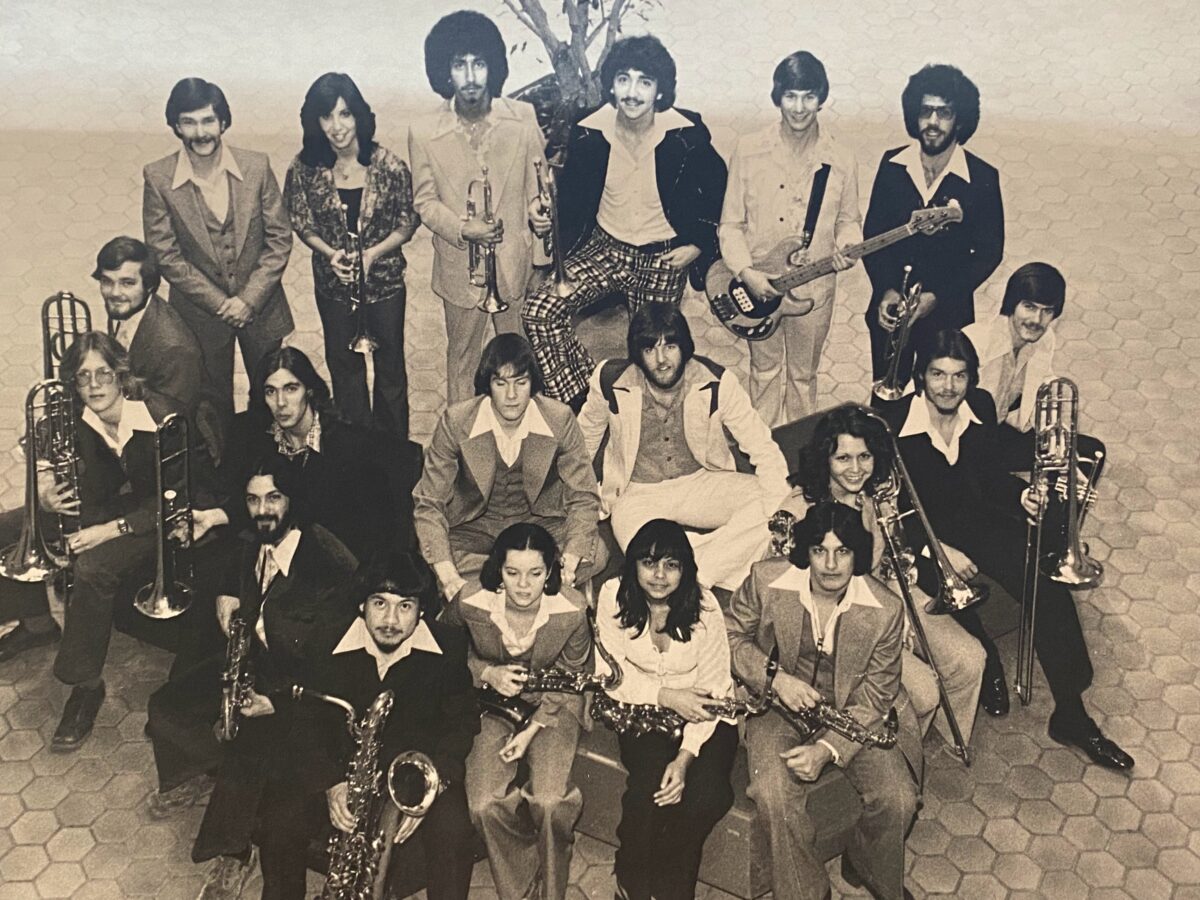
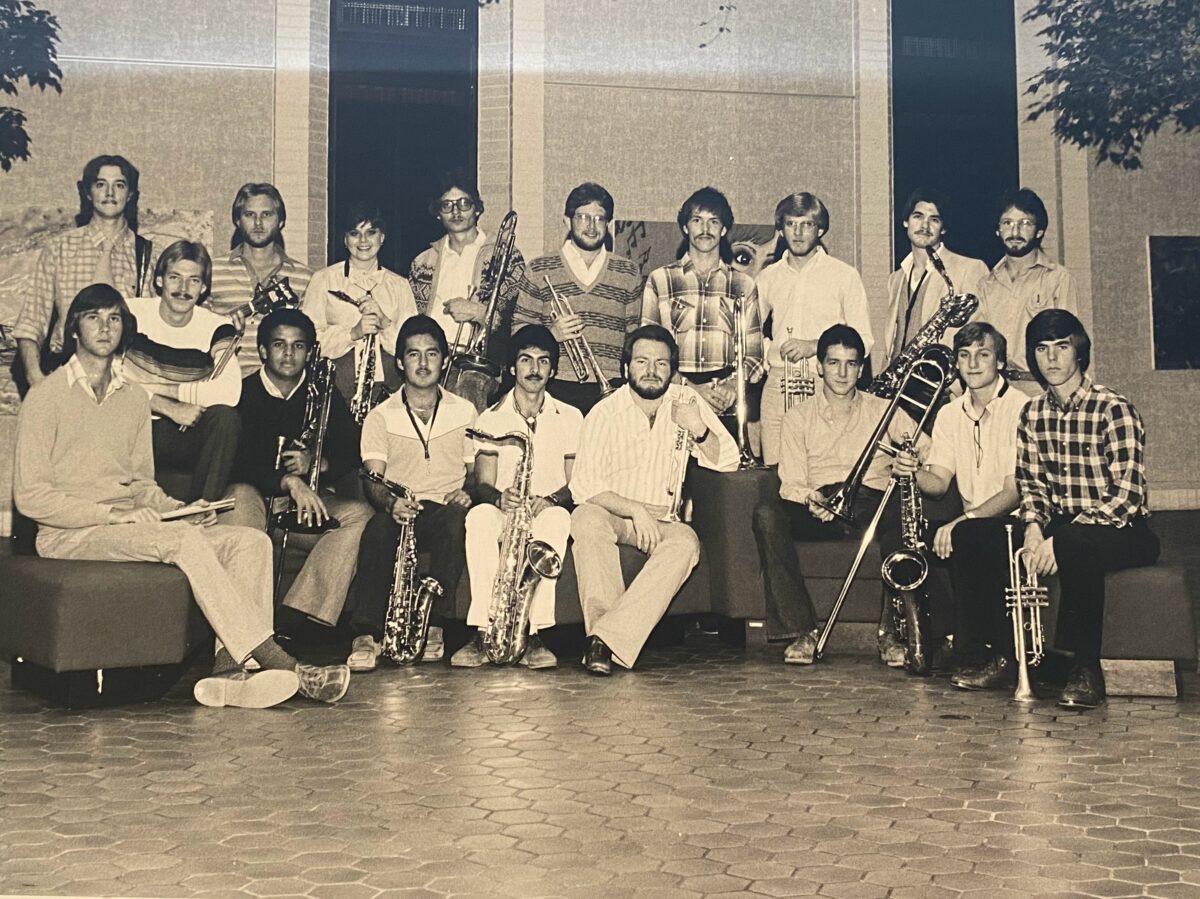
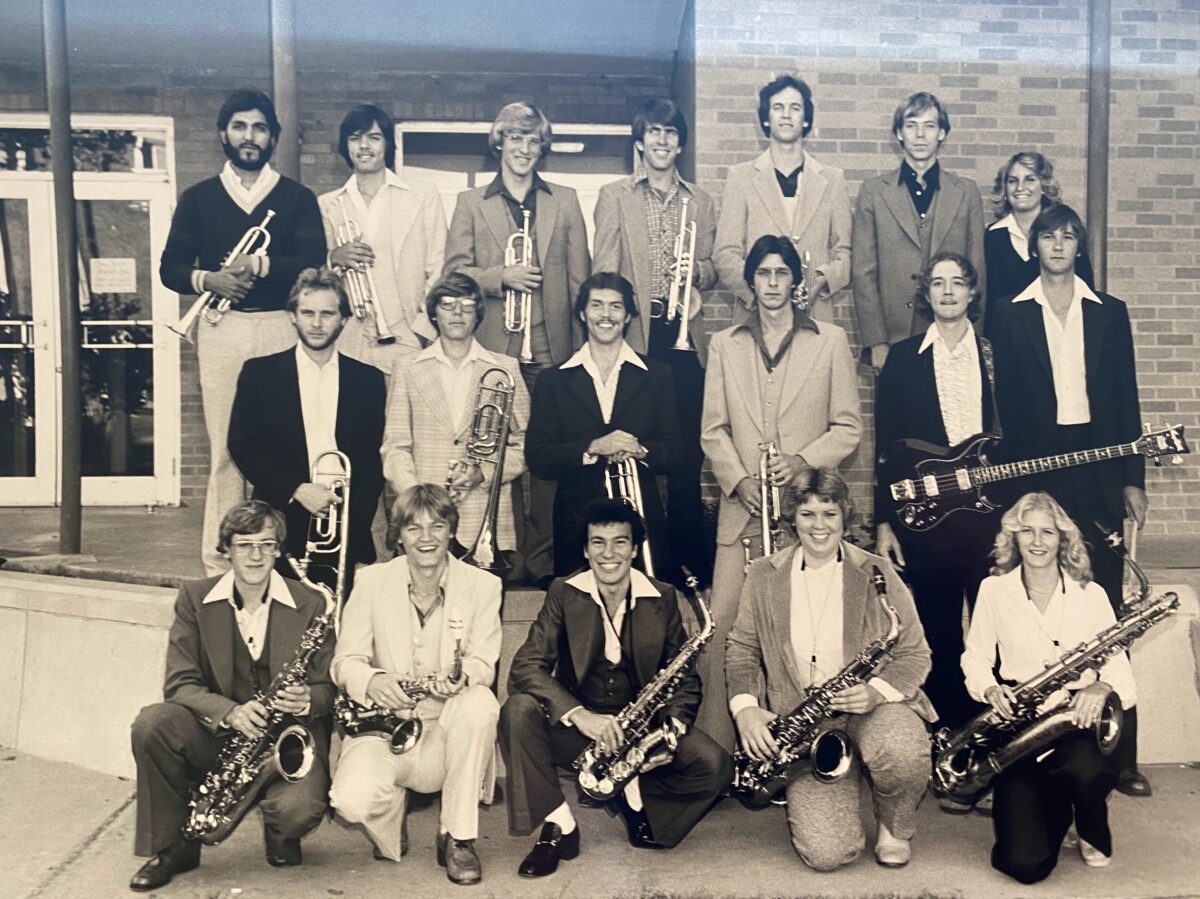
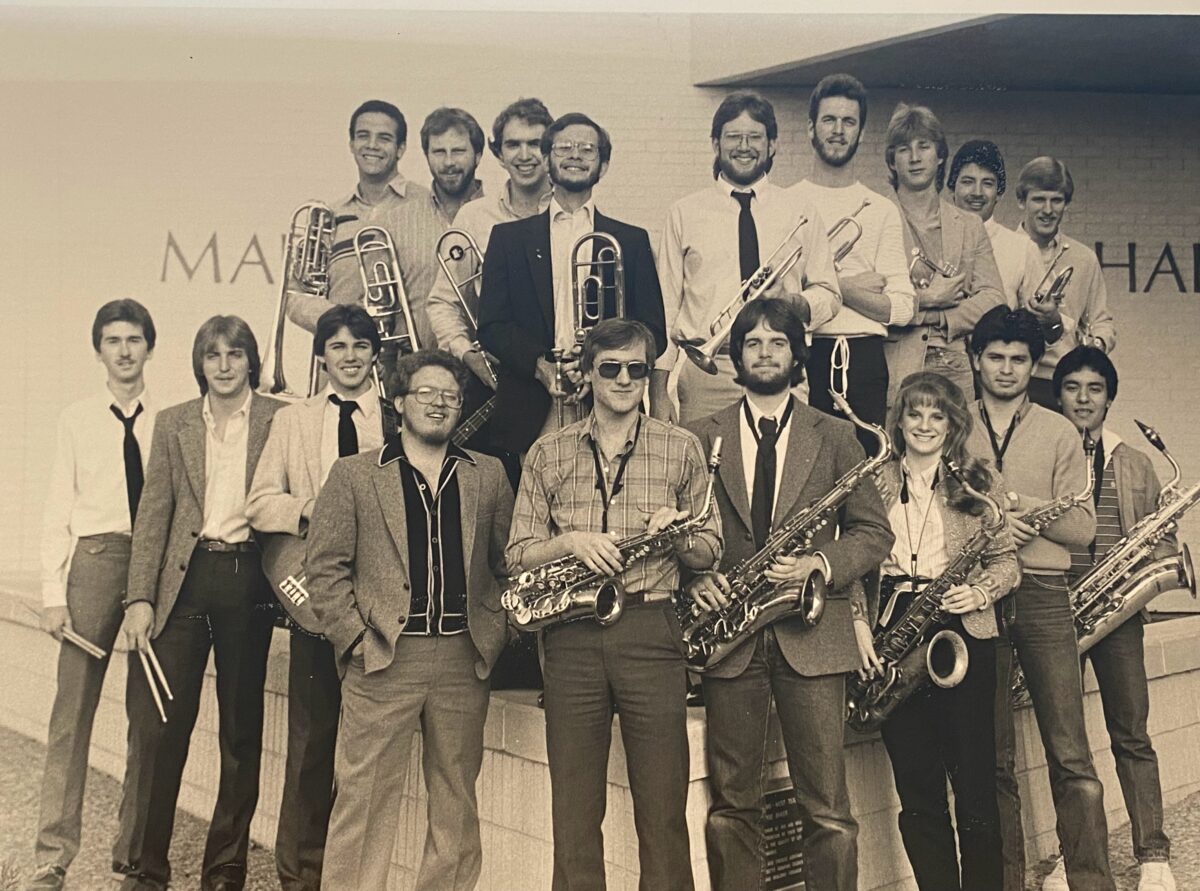
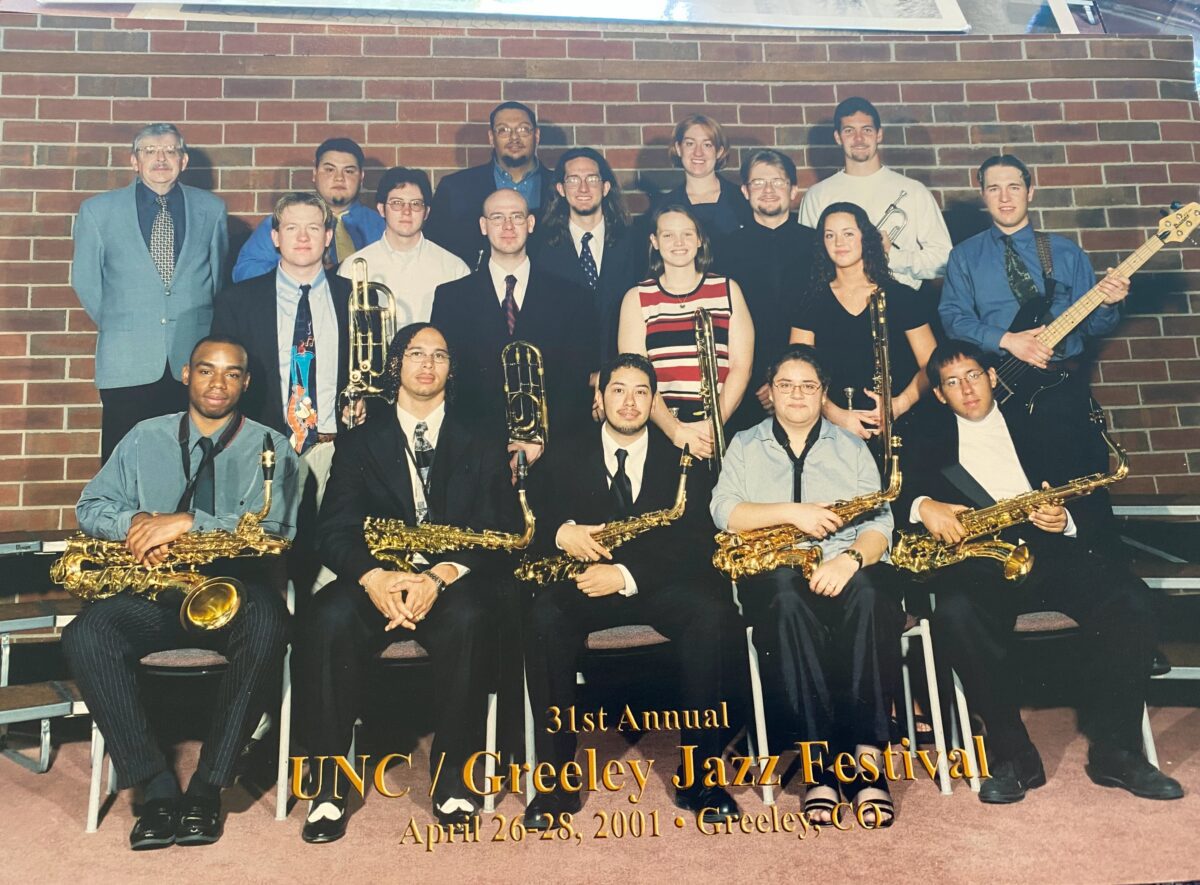
Not being a brass player, my interactions with Mr. Ritter were limited. My locker was right next door to his studio and he was familiar for sure. His history is quite a read and he has accomplished quite a bit. Best to you Mr. Ritter
I was so fortunate to have been taught by Mr. Ritter in Brass Choir and Jazz Band. I also have fond memories of playing with him in Tiffany Brass. The trumpet studio in the 70’s was amazing. Mr. Ritter has always been a fantastic musician, relatable teacher, and caring mentor. Cody, thanks so much for this article. I really enjoyed seeing all of the photographs. Thank you, Mr. Ritter, for all of the support you gave me at WT.
What a great interview with the great Dave Ritter! Playing under Dave in our WT jazz band was terrific, and a true learning experience. Playing with the newly formed “Tiffany Brass” (after my graduation from WT) was another great experience with Dave Ritter. Dave is not only a terrific trumpet player/teacher, but was ALWAYS the epitome of “COOL!”
Also Thanks, Dave, for helping me through my Masters Recital, when Don Baird had his first heart attack. You were so kind and helpful. I’m so lucky to have had you in my musical life!
Terrific Article
DR and CM are two of the best to ever do their jobs. I have wonderful memories of my time at WT. Music holds a very special place in my life. Jerilyn and I shared many amazing musical moments together. DR -GG – DB – and many others helped mold and shape the lives of countless thousands of students. Well Done !!
CM- thanks for taking the time to do the interview. It was very informative as well as interesting!! There’s just something special about people who can teach music!! Be Blessed!! Gary L